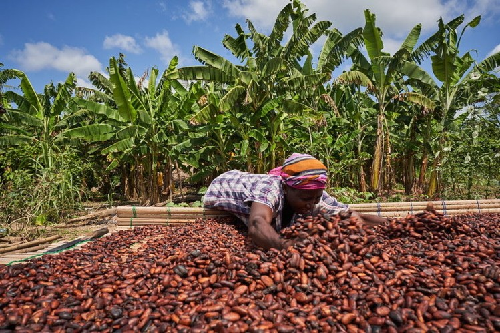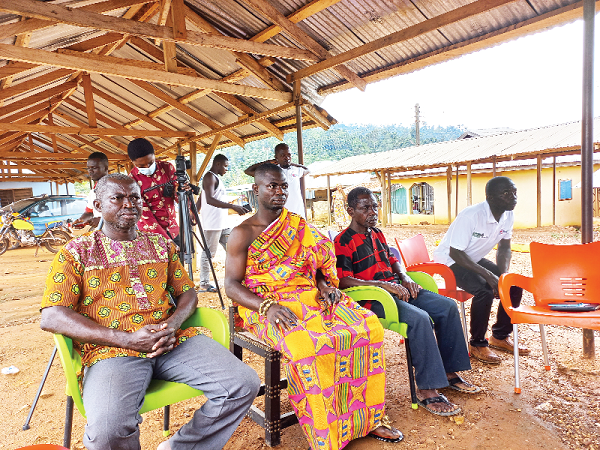
Cocoa rehabilitation programme: Western North farmers lament unfulfilled promises
Initially, we thought the rehabilitation programme was going to be the answer to the swollen shoot disease that has affected our farms, so we willingly accepted to be part of the programme.
“The government also promised to help us replant the farm and also support us with plantain suckers that we would use as an alternative source of livelihood while we waited for the replanted cocoa to grow and fruit.
“But what is happening now is far from what we were promised.”
These were sentiments expressed by a 54-year-old cocoa farmer, Ms Helena Brenyah of Sefwi Penakrom in the Sefwi Bekwai District when members of the Ghana Agricultural and Rural Development Journalists Association (GARDJA) visited some of the cocoa communities in the Western North Region to assess their readiness for the new cocoa season and the progress of the rehabilitation programme.
Some of the communities visited included Daboase, Adjakaa Manso, Manso Nkwanta No1 and No2, Ntrentreso, Penakrom and Suroano all in the Sefwi Bekwai District.se were cut down some four years ago but only part of it had been replanted.
“We were told that workers would be recruited to help replant the trees and also maintain them for at least two years before we take over full responsibility of the farms,” she stated.
However, she said her farm had been abandoned and “even the plantain suckers promised never came.”
A farmer at Ntrentreso, Madam Charity Panin, opined that some of the people taking part in the replantation of the cocoa trees lacked knowledge in cocoa farming.
“How can you be planting cocoa seedlings during the dry season? she asked and added that some of them had taken it upon themselves to replant their farms and not wait for the government.
Rehabilitation

One of the rehabilitated farms at Aboanidua
The government, through an African Development Bank (AfDB facility, has embarked on a programme to rehabilitate all diseased cocoa farms as part of the efforts to increase cocoa production in the country.
Under the programme, the government would cut down all cocoa farms affected by the Cocoa Swollen Shoot Virus Disease (CSSVD) and replant and manage them for two years before giving them back to the farmers.
Every farmer is also to be supplied with plantain suckers to be planted with the cocoa seedlings and also paid a compensation of GH¢1,000 per a hectare of cocoa farm.
The government would also pay for the services of extension officers and labourers who would plant the seedlings and weed the farms for the next two years before handing them over to the farmers.
The old diseased cocoa trees would be replaced by high yielding and disease resistant and early maturing cocoa trees to help the government boost its cocoa production and also help the farmers to recover from the period of ‘inactivity’.
Poor implementation

Nana Kwasi Asante II (2nd left), the Chief of Ntrentreso
The Chief of Ntrentreso, Nana Kwasi Asante II, said although the programme was a laudable one that could help cocoa farmers revive their farms and also help the country to increase its production, “the implementation has been very bad.”
According to him, the youth, who had been engaged to work on the farms, were not being paid on time, which was serving as a disincentive to the programme.
Besides, “the compensation promised to the farmers has not been paid. While the government promised to pay GH¢1,000 for each hectare of cocoa farms destroyed, some have been paid just GH¢500.”
He was very particular about the delay in the payment for the youth recruited to work on the farms, saying it showed no respect for the people employed.
That, he explained, had also affected the implementation of the programme as the youth did not feel motivated enough to work on the farms, leading to many of them abandoning the farms.
He said the farm that was used as a demonstration farm for the exercise at Aboanidua “has been well maintained, painting the picture as if all the farms are doing well. Meanwhile, just few metres away from that farm is another which has been left to its fate.”
Farm inputs
Aside the issues with the rehabilitation programme, the farmers also complained about the inadequate supply of fertiliser and other farm inputs by COCOBOD.
On the distribution of the fertiliser and other farm inputs to cocoa farmers, most of the farmers were of the view that it would be better for the government to make the product available on the market for the farmers to buy it themselves.
They said the supply was woefully inadequate and were of the view that it was one of the reasons for the use of unapproved chemicals and fertiliser on the farms.
Even though the cocoa mass spraying exercise was supposed to be apolitical, some of the farmers claimed the exercise had been politicised.
The farmers expressed the fear that if the challenges facing the programme were not addressed early, aside affecting the nation’s drive to increase its cocoa production, they would also greatly affect the livelihoods of the farmers whose farms were affected.
Some of the farmers claimed that already, the youth who had been recruited to work on the farms were abandoning the farms and migrating to areas where mining was rife “since they earned more from that than the weeding.”
According to the farmers, even though cocoa was the mainstay of the country's economy, the support they received from the government was nothing to write home about. They accused the bureaucrats and technocrats of enjoying at their expense.
Aside from neglecting their communities, the farmers claimed that most of the interventions for the sector never reached the real beneficiaries and called for more stringent monitoring of the mass spraying exercise and the free fertiliser distribution.
They also appealed to the government to allow them to manage their own farms during the rehabilitation period.
Union
The Chairman of the Sefwi Bekwai Cooperative Cocoa farmers Union, Mr Salifu Issaka, confirmed the concerns of the farmers and said they had escalated the matter to the district and regional offices of the COCOBOD and the Ministry of Food and Agriculture.
On the workers employed to provide assistance and technical support to the farmers, he explained that since they were being paid monthly, most of them had not been going to work but would want to be paid at the end of the month.
In order to forestall that, he said the programme had given each worker a target of weeding six acres per month and it was only after meeting the target that one could be paid.
“It does not matter whether you use one day or two days to clear the six acres, once you are able to achieve your target, you will be paid,” he said.
However, Ms Florence Asamaoh, one of the workers, believed that six acres a month was too much for a payment of GH¢500 a month.
